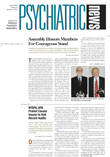Persons who secrete an excessive amount of the stress hormone cortisol in the presence of stressful situations may have a higher risk of developing depression, since stress has been closely linked with the onset of depression, and adults with major depression can have elevated cortisol levels. But could a particular cortisol-secretion profile during childhood be a biological marker for depression vulnerability? Quite possibly, preliminary research data suggest.
The findings come from Adriana Feder, M.D., an assistant clinical professor of psychiatry in medicine at Columbia University, and colleagues. Feder discussed them at the 15th Annual Scientific Symposium of the National Alliance for Research on Schizophrenia and Depression (NARSAD) in New York City in October. NARSAD uses its scientific symposia to showcase some of the more exciting research being pursued by young NARSAD-sponsored investigators.
During the 1970s, the 24-hour cortisol-secretion patterns of 50 depressed, 24 anxious, and 12 psychologically healthy children were assessed. These 86 youngsters were then followed up 10 to 15 years later to learn their psychological status.
It turned out that 20 who had been either psychologically healthy or anxious, but not depressed, as youngsters went on to develop a major depression as an adult.
Feder and her colleagues used these subjects and the data about them to conduct their own study to see whether a person’s cortisol-secretion pattern during childhood might reflect depression vulnerability.
In one phase of their study, the researchers examined the cortisol-secretion patterns of the 50 subjects who had been depressed as youngsters. They found that the patterns were similar—an abnormally elevated cortisol level during the evening and an abnormal delay in the rise of cortisol during the night. This finding suggested that this deviant childhood cortisol-secretion profile might be a biological marker for depression susceptibility during childhood.
In another phase of their study, Feder and her team scrutinized the childhood cortisol-secretion patterns of the 20 subjects who had not been depressed as youngsters, yet who developed a major depression as adults. They found that the patterns were essentially identical to the atypical childhood cortisol-secretion profile exhibited by the 50 subjects who had been depressed as youngsters.
This finding implied that this abnormal childhood cortisol-secretion profile might be a biological marker not just for depression susceptibility during childhood, but also for depression susceptibility during adulthood.
Putting both findings together, the researchers raised the provocative possibility of identifying, via childhood cortisol-secretion tests, individuals who are at risk of depression either during childhood or adulthood.
This conclusion was voiced at the NARSAD symposium by Husseini Manji, M.D., chief of the Laboratory of Molecular Pathophysiology at the National Institute of Mental Health. (Manji was asked to comment on the research of Feder and her team, as well as on other studies presented at the symposium.)
But even if individuals who were especially vulnerable to depression because of an abnormal cortisol response were identified, what could be done to keep them from developing depression? Using cognitive-behavioral therapy to teach them how to better deal with stress is one possibility, Feder said. Also, drugs are being developed to counter excessive cortisol secretion, and such drugs might likewise benefit individuals with this risk factor, she added. ▪

